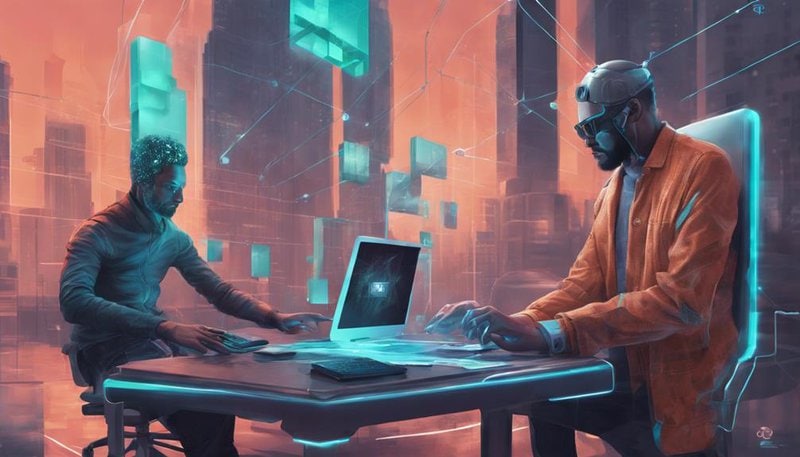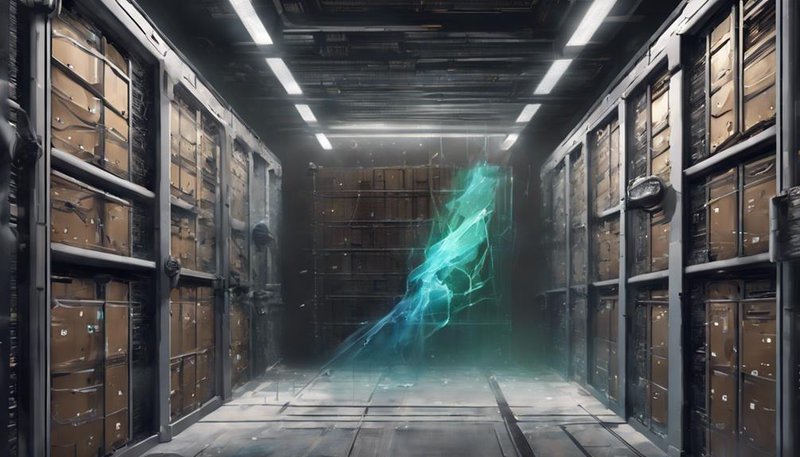How NFTs Work: The Technology Behind the Trend

NFT technology encompasses various key components such as blockchain, smart contracts, and decentralized storage.
Blockchain serves as the underlying technology that ensures the authenticity and uniqueness of each NFT.
Smart contracts are self-executing contracts with the terms of the agreement directly written into code.
Decentralized storage allows for the secure and permanent storage of the digital assets associated with NFTs.
The Basics of NFTs
To truly understand the essence of NFTs, one must grasp the fundamental concept of digital ownership in the ever-evolving landscape of blockchain technology. NFTs, or non-fungible tokens, have reshaped the way we perceive ownership in the digital realm. The NFT market dynamics are a reflection of the shifting tides within the art, collectibles, and entertainment industries. These tokens haven't only opened up new avenues for creators to monetize their work but have also sparked a revolution in how we define value and ownership in a digital age.
The cultural impact of NFTs extends beyond mere financial transactions. They've become a symbol of authenticity and uniqueness in a world inundated with copies and replicas. Through NFTs, artists can directly connect with their audience, bypassing traditional gatekeepers. This shift has empowered creators and collectors alike, fostering a sense of community and collaboration that transcends geographical boundaries. The rise of NFTs isn't merely a trend but a transformative force shaping the future of digital ownership and creativity.
Tokenization and Ownership
In navigating the realm of NFTs, understanding tokenization and ownership is like deciphering the key to unlocking the true potential of digital assets. Tokenization, the process of converting real-world assets into digital tokens, revolutionizes the concept of ownership. Through ownership verification on the blockchain, individuals can possess unique, irrefutable proof of owning a digital asset, granting them exclusive rights and benefits.
Furthermore, fractional ownership emerges as a transformative concept within the NFT space. By dividing assets into smaller, tradable units, fractional ownership enables broader participation in high-value assets that were once out of reach for many. This democratization of ownership opens up new avenues for investment and collaboration, fostering a sense of community and inclusivity among stakeholders.
Smart Contracts and NFTs

Understanding the intricate relationship between smart contracts and NFTs unveils a realm of boundless possibilities in the digital asset landscape. Smart contracts serve as the backbone of NFT technology, enabling automated contract execution upon predefined conditions being met. Through blockchain integration, these self-executing contracts ensure transparency and trust in NFT transactions, eliminating the need for intermediaries. This integration fosters a secure environment where ownership rights are indisputable and tamper-proof, revolutionizing the way assets are bought, sold, and traded in the digital realm.
Embracing smart contracts within the NFT ecosystem paves the way for efficient, secure, and seamless transactions, empowering individuals to engage in digital asset exchanges with confidence. By automating contract terms through code, the risk of human error or manipulation diminishes significantly, bolstering the integrity of NFT transactions. This fusion of contract execution and blockchain technology not only streamlines processes but also sets a new standard for authenticity and accountability within the digital asset space.
Interoperability and Standards
Embracing the essence of interoperability and adhering to established standards in the NFT ecosystem elevates the potential for seamless digital asset exchange and collaboration.
- Cross Chain Compatibility: Ensuring NFTs can move between different blockchains expands their utility and reach, fostering a more interconnected digital economy.
- Protocol Integration: Harmonizing diverse blockchain protocols enhances the ability of NFTs to function across various platforms, promoting a more cohesive ecosystem.
- Industry Standards: Establishing common practices and guidelines within the NFT space cultivates trust, reliability, and uniformity, laying a solid foundation for sustainable growth.
Decentralized Storage Solutions

Fostering a decentralized approach to storage solutions imbues NFT ecosystems with resilience and autonomy, empowering users to safeguard their digital assets securely. Decentralized networks play a pivotal role in ensuring data security within the realm of NFTs. By distributing information across a network of nodes rather than relying on a central authority, decentralized storage solutions mitigate the risks associated with single points of failure or potential cyber attacks.
These networks not only enhance the security of NFT data but also provide users with greater control over their assets. Through encryption and distributed consensus mechanisms, decentralized storage solutions offer a robust framework for protecting the integrity and confidentiality of digital assets.
Embracing decentralized storage solutions signifies a commitment to upholding the principles of autonomy and security within the NFT space. By harnessing the power of decentralized networks, individuals can rest assured that their valuable digital assets are shielded from vulnerabilities and unauthorized access, fostering a sense of trust and reliability in the burgeoning world of NFT technology.
Proof of Ownership on Blockchain
Engage with the immutable nature of blockchain technology to assert your ownership definitively within the realm of NFTs. The blockchain serves as a ledger that records transactions in a secure, unchangeable manner, ensuring the integrity of digital assets like NFTs. Here's how you can understand the proof of ownership in this innovative space:
- Immutable Records: The blockchain's design ensures that once a transaction is recorded, it can't be altered or deleted. This feature guarantees the authenticity and permanence of your ownership of an NFT.
- Digital Assets Security: By leveraging blockchain technology, NFTs provide a secure way to prove ownership of digital assets. Your ownership is secured by cryptographic principles, making it tamper-proof and transparent.
- Ownership Verification: Through blockchain's transparency, anyone can verify your ownership of an NFT by tracing its history on the blockchain. This verification process adds a layer of trust and authenticity to the concept of digital ownership.
NFT Marketplaces and Transactions

In navigating the realm of NFTs, one must now explore the dynamic landscape of NFT marketplaces and transactions. When delving into NFT marketplaces, you encounter a variety of platforms offering unique digital assets for sale. These marketplaces play a pivotal role in facilitating transactions between creators and buyers, each with its own pricing dynamics and user experience. Ensuring a seamless and secure experience for users is paramount in these digital spaces. However, it's essential to be mindful of security concerns and legal implications surrounding NFT transactions.
To better understand the nuances of NFT marketplaces and transactions, let's delve into the following table:
| Aspects | Description |
|---|---|
| Pricing Dynamics | Varied pricing strategies influence NFT valuations. |
| User Experience | Intuitive platforms enhance user satisfaction. |
| Security Concerns | Safeguarding digital assets is crucial for trust. |
| Legal Implications | Understanding copyright and ownership laws is vital. |
Future Trends in NFT Technology
Embracing the future of NFT technology entails staying attuned to emerging innovations and evolving market trends. As you journey into the realm of NFTs, here are three significant trends to keep an eye on:
- NFT Gaming Applications: The integration of NFTs in gaming is set to revolutionize the industry by offering players true ownership of in-game assets. Expect to see more games utilizing NFTs for unique items, character customization, and even entire virtual worlds.
- NFT Art Evolution: The evolution of NFT art is an exciting trend to watch, with artists exploring new mediums and concepts through non-fungible tokens. From dynamic digital art pieces to interactive experiences, the boundaries of traditional art are being pushed in unprecedented ways.
- Innovative Utility: Look out for NFTs being used beyond collectibles and art. Industries such as real estate, music, and even education are starting to explore the potential of NFT technology for authentication, ownership, and decentralized systems. Stay curious and open-minded as the possibilities are endless in this rapidly evolving landscape.
Frequently Asked Questions
How Are NFTs Impacting the Gaming Industry?
In the gaming industry, NFTs are revolutionizing virtual economies and driving gaming innovation. Embrace this transformative technology to unlock new possibilities, enhance player experiences, and create unique opportunities for both creators and gamers alike.
What Are the Environmental Implications of NFTs and Blockchain Technology?
Consider the environmental implications of NFTs and blockchain tech. They raise concerns about carbon footprint and energy consumption due to the energy-intensive mining process. It's crucial to balance innovation with sustainability for a greener future.
Are There Any Potential Legal Challenges or Risks Associated With Owning and Trading Nfts?
When it comes to NFTs, potential legal challenges like authenticity disputes and copyright infringement may arise. Ownership rights can be complex due to the digital nature of NFTs. It's crucial to understand these legal implications before trading.
How Do NFTs Impact Traditional Art Markets and the Concept of Ownership?
In the realm of ownership rights, NFTs revolutionize traditional art markets by providing digital authentication. The concept of ownership expands beyond physical boundaries, challenging norms and enhancing the value of art in new, innovative ways.
Can NFTs Be Used for Purposes Beyond Art and Collectibles, Such as in the Healthcare or Real Estate Industries?
In healthcare innovation, NFTs can revolutionize patient data security and streamline medical records. Real estate applications could see transparent property transactions and immutable ownership records. Embrace the potential of NFTs to transform various industries.








